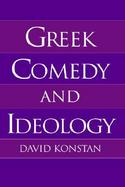Greek Comedy and Ideology
- Binding: Hardcover
- Publisher: Oxford Univ Pr on Demand
- Publish date: 03/01/1995
Description:
Comedy, with its happy endings, attempts to resolve conflicts that arise in the real world. These conflicts, however, leave their mark on the texts in the form of gaps in plot and inconsistencies in characterization. Greek Comedy and Ideology, exploits a new and distinct critical method - ideological criticism - to analyze how ancient Greek comedy betrays and responds to cultural tensions in the society of the classical city-state. Konstan begins by examining the utopian features of Aristophanes' comedies - for example, an all-powerful city inhabited by birds, or a world of limitless wealth presided over by the god of Wealth himself - as interventions in the political issues of his time. He goes on to explore the more private world of Menandrean comedy (as well as two adaptations of Menander by the Roman playwright Terence), illustrating how problems of social status, citizenship, and gender are negotiated by means of elaborately contrived plots. Konstan closes with a chapter examining an imitation of ancient comedy by Moliere, and the way in which the ideology of emerging capitalism transforms the premises of the classical genre.
Expand description
Product notice
Returnable at the third party seller's discretion and may come without consumable supplements like access codes, CD's, or workbooks.
| Seller | Condition | Comments | Price |
|
BookReadingInc
|
Acceptable
|
$181.57
|
|
BookReadingInc
|
Good
|
$181.67
|
|
BookScene
|
Very Good
|
$140.62
|
|
readmybooks
|
Acceptable |
$179.77
|
|
readmybooks
|
Good |
$179.87
|
|
GridFreed
|
New |
$222.35
|

Please Wait

